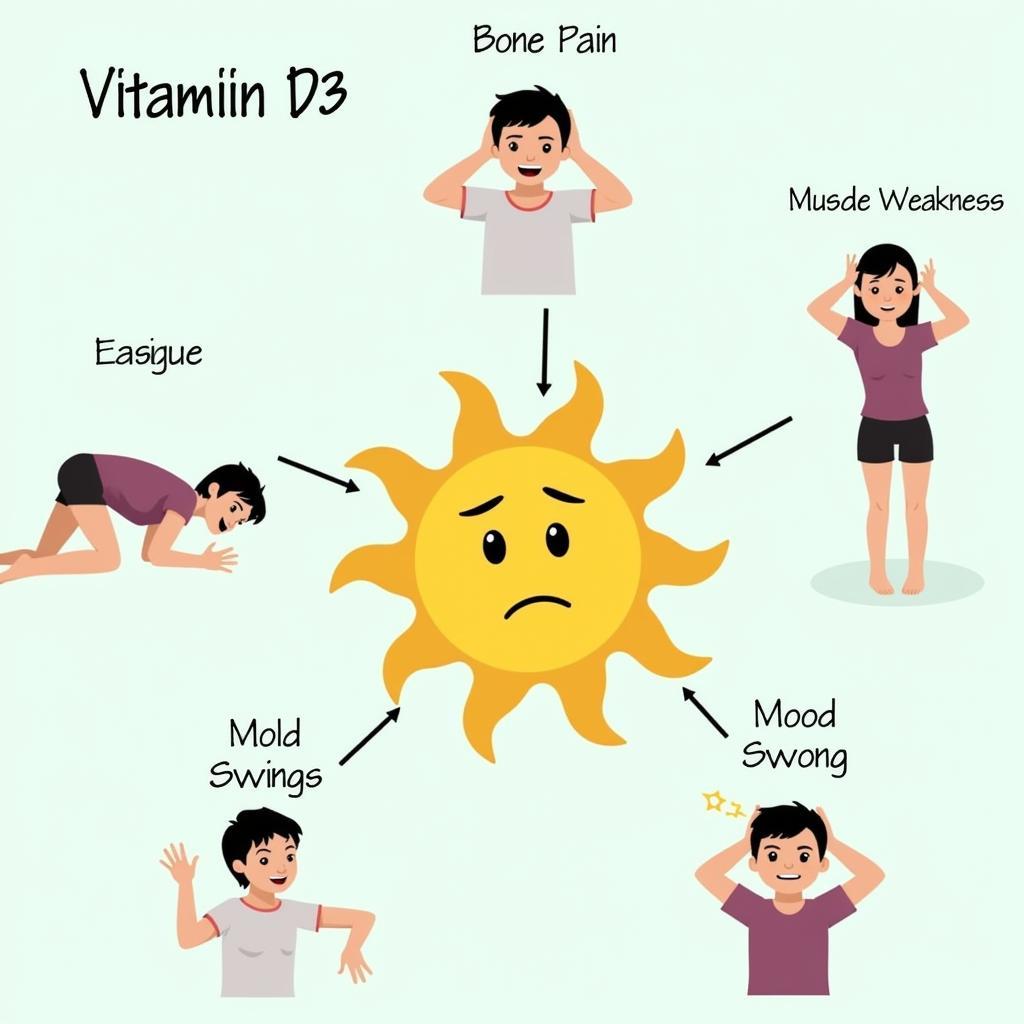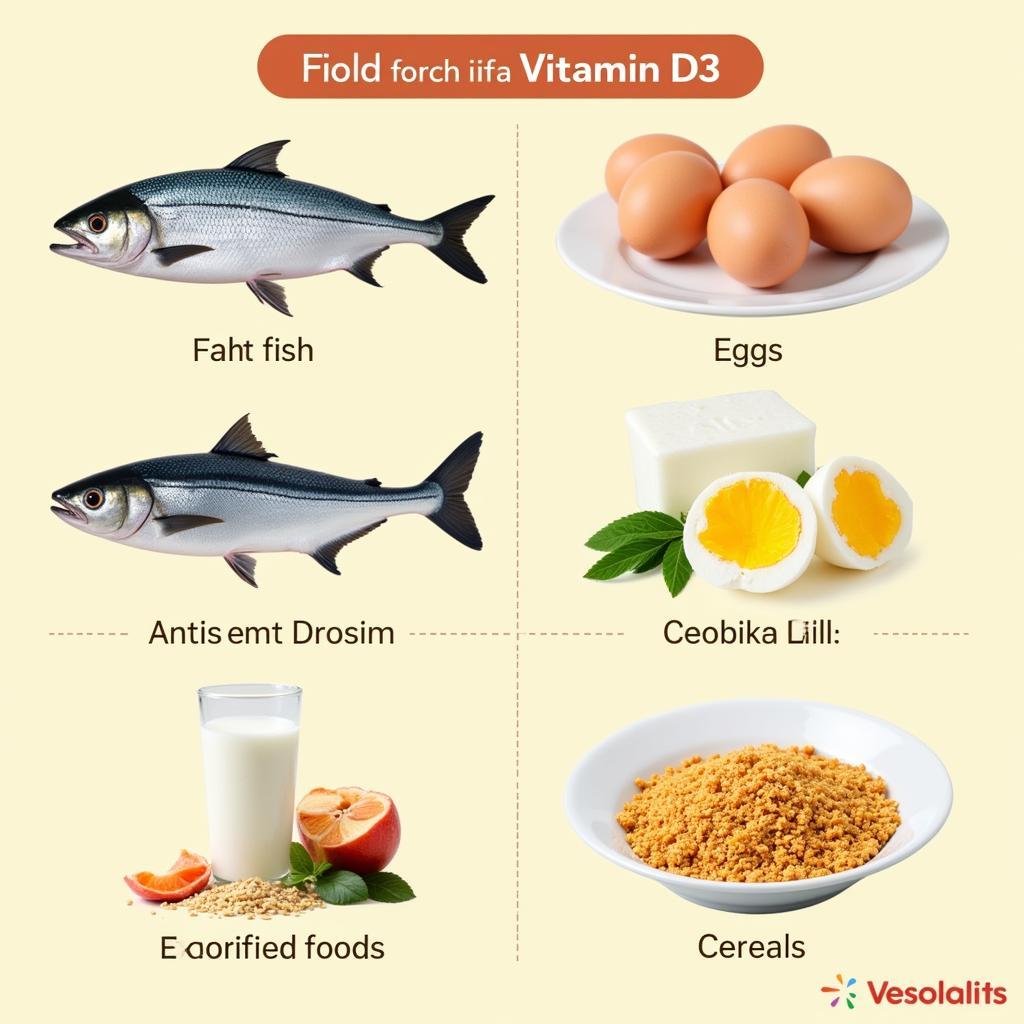Vitamin D3, also known as the “sunshine vitamin,” plays a crucial role in maintaining overall health and well-being. In Pakistan, where sunshine is abundant, vitamin D deficiency is surprisingly common, affecting a significant portion of the population. This comprehensive guide delves into the importance of vitamin D3, the prevalence of deficiency in Pakistan, and the best sources to ensure adequate levels.
 Vitamin D3 Deficiency Symptoms
Vitamin D3 Deficiency Symptoms
Understanding Vitamin D3 and its Significance
Vitamin D3 is a fat-soluble vitamin that our bodies produce when exposed to sunlight. It’s also found in certain foods and available as a dietary supplement. Unlike other vitamins that primarily act as antioxidants, vitamin D3 functions more like a hormone, regulating numerous bodily processes, including:
- Calcium Absorption: Vitamin D3 promotes calcium absorption in the gut, essential for strong bones and teeth.
- Bone Health: It works in conjunction with calcium to build and maintain bone density, reducing the risk of osteoporosis and fractures.
- Immune Function: Vitamin D3 plays a vital role in supporting a healthy immune system, helping the body fight off infections.
- Mood Regulation: Studies suggest that adequate vitamin D3 levels may contribute to improved mood and cognitive function.
 Sources of Vitamin D3
Sources of Vitamin D3
Vitamin D3 Deficiency in Pakistan: A Growing Concern
Despite ample sunshine in Pakistan, vitamin D deficiency is widespread. Factors contributing to this paradox include:
- Cultural Practices: Traditional clothing and limited outdoor activities, especially among women, can restrict sun exposure.
- Dietary Habits: Limited consumption of vitamin D-rich foods, such as fatty fish and fortified dairy products, contributes to the problem.
- Skin Pigmentation: Darker skin pigmentation requires longer sun exposure to produce the same amount of vitamin D3 as lighter skin.
- Lifestyle Factors: Increasing urbanization and indoor lifestyles further limit sun exposure opportunities.
Recognizing the Signs of Vitamin D3 Deficiency
Vitamin D3 deficiency often goes undetected because symptoms can be subtle or mimic other conditions. Common signs include:
- Fatigue and Weakness
- Bone and Muscle Pain
- Hair Loss
- Slow Wound Healing
- Mood Changes
If you suspect vitamin D3 deficiency, consult a healthcare professional for a blood test to determine your levels.
Boosting Your Vitamin D3 Levels: Natural Sources and Supplementation
Sunlight: The Best Source
Spending 15-20 minutes in the sun, with exposed skin and without sunscreen, during peak hours (10 am to 3 pm) can significantly boost vitamin D3 production.
Dietary Sources:
Include these vitamin D3-rich foods in your diet:
- Fatty Fish: Salmon, tuna, mackerel
- Eggs: Especially the yolk
- Mushrooms: Certain varieties, like shiitake and button mushrooms
- Fortified Foods: Milk, yogurt, orange juice, cereals
Vitamin D3 Supplements:
For individuals struggling to meet their needs through sunlight and diet alone, supplements offer a convenient and effective solution. Vitamin D3 tablets price in Pakistan is generally affordable and accessible.
 Vitamin D3 Supplements in Pakistan
Vitamin D3 Supplements in Pakistan
Choosing the Right Vitamin D3 Supplement
When selecting a vitamin D3 supplement, consider the following factors:
- Dosage: Consult a healthcare professional to determine the appropriate dosage for your needs.
- Form: Vitamin D3 supplements are available in various forms, including tablets, capsules, and liquid drops.
- Quality: Choose reputable brands that adhere to strict manufacturing standards.
Conclusion: Prioritizing Vitamin D3 for a Healthier Pakistan
Vitamin D3 is vital for maintaining optimal health, and deficiency is a prevalent concern in Pakistan. By understanding the importance of vitamin D3, recognizing the signs of deficiency, and incorporating natural sources and supplements, individuals can take proactive steps towards ensuring adequate levels. Prioritizing vitamin D3 intake can contribute to a healthier, stronger, and more vibrant population in Pakistan.
FAQs about Vitamin D3 in Pakistan
1. What is the recommended daily intake of vitamin D3?
The recommended daily intake of vitamin D3 varies depending on age, health status, and sun exposure. For adults, 600 IU is generally recommended.
2. Can I get enough vitamin D3 from sunlight alone?
While sunlight is the best source of vitamin D3, factors like time of day, season, skin pigmentation, and clothing can impact production.
3. Are there any side effects of taking vitamin D3 supplements?
Vitamin D3 supplements are generally safe when taken as directed. However, excessive intake can lead to side effects like nausea, vomiting, and weakness.
4. What are some reputable brands of vitamin D3 supplements available in Pakistan?
Several reputable brands offer high-quality vitamin D3 supplements. It’s advisable to consult a healthcare professional or pharmacist for recommendations based on your specific needs. For example, you can explore options like Ossobon D tablets price in Pakistan or check the general vitamin D price in Pakistan to compare different brands and formulations.
5. How long does it take to correct a vitamin D3 deficiency?
The time it takes to correct a deficiency depends on the severity and individual factors. It may take several weeks or months of consistent supplementation and lifestyle changes.
For further assistance and personalized guidance on vitamin D3 and your health, contact our team of experts at:
Phone Number: +923337849799
Email: [email protected]
Address: Dera Ghazi Khan Rd, Rakhni, Barkhan, Balochistan, Pakistan.
We are available 24/7 to answer your queries and provide support.